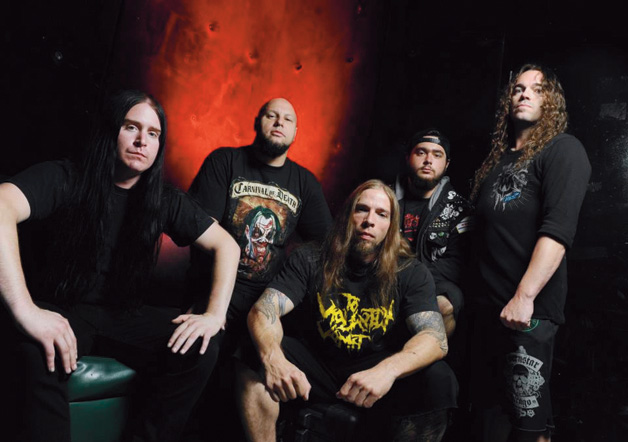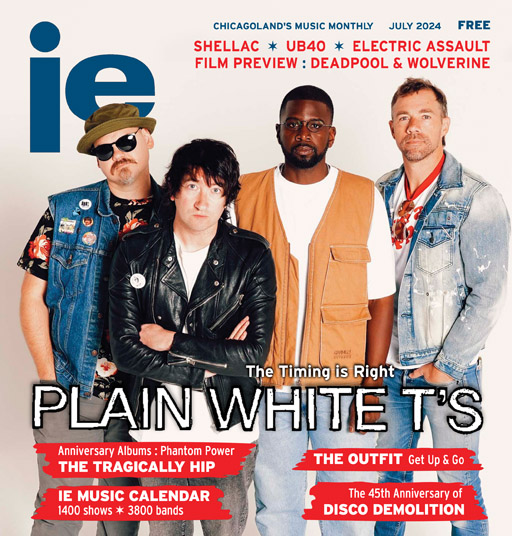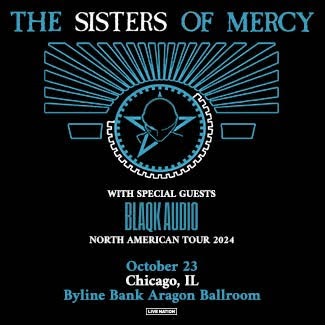Caught In A Mosh: October 2013
Born From A Dark Poem
There’s a photograph floating around the Internet of Joe Ptacek in 1994 that you need to see. It’s a candid shot of the frontman of the one Warren Township death metal band lucky enough to be on the same label as Cannibal Corpse at the dawn of death metal’s notoriety in the United States. The subject isn’t holding “invisible oranges,” posing crazily in reference to an obscure Italian zombie film, or even brooding. He’s simply relaxing on a well-worn recliner in the basement of his house in Wildwood, IL, cuddling a large dog whose ears and eyes convey soft trust in the grip of a loving master.
On an end table beside the 20-something “esophagus” of Broken Hope and his white pit bull, Mojo, are mementos of a darker life, the one for which Ptacek is known around the world. Behind an ashtray and in front of a framed black-and-white Broken Hope publicity photo sits an unused band sticker: the crude, jagged logo of Immolation, a New York death metal contemporary named after a word that means killing or offering as a sacrifice (referring to “self-immolation” when the sacrifice is suicide).
“Ross Dolan from Immolation played an important role in getting Broken Hope’s name out there,” recalls founding Broken Hope guitarist Jeremy Wagner by telephone from his current home in the north suburbs. “He already had a list [when Broken Hope recorded its first demo in 1990] of all these fanzines from around the world that would review your demo, and these fanzines would be sold through the underground and sold at shows in whatever country they were [made], whether it was Paris [France], where Peardrop zine was from; or Slayer magazine, which was up in Norway . . .
“He gave me the list,” Wagner says, adding, “And from there, here we are, 25 years later.” As the guitarist promotes a Broken Hope documentary included in the digipak version of his rebooted band’s haunted crime scene of a new album, Omen Of Disease (due out Oct. 1 on Century Media, the group’s new label), he does so without Ptacek. The man with some of the lowest pipes in death metal reportedly died of a self-inflicted gunshot wound to the head in 2010. By then, Broken Hope had also died, on hiatus since the early 2000s. But Wagner says that he, bassist Shaun Glass, and Ptacek had talked seriously in the late 2000s about bringing Broken Hope out of hibernation together. Gone at age 37, but not forgotten, not by the current lineup – Wagner, Glass, vocalist Damian Leski, guitarist Chuck Wepfer, and drummer Mike Miczek – which closes the steadfast Omen Of Disease with a ravaging rerecording of “Incinerated” off 1991’s Swamped In Gore. It’s a salute to those who brought high-caliber death metal to Warren Township, and left a piece of Warren Township with the rest of the world. Ptacek was preceded in death by Mojo, Wagner says in an e-mail after the interview. And until Jan. 20, 2010, the vocalist wore some of the dog’s ashes in a vial hanging from his neck, nearest to his esophagus.
Mosh: Didn’t you and Joe Ptacek grow up together?
Jeremy Wagner: Pretty much. When I met Joe, I was like 16, 17. From that point on, we went to a ton of shows together in Chicago and Milwaukee. We saw some amazing shows when we were younger. It was awesome, and when we formed Broken Hope [in the late ’80s] . . . we got to see the world together. We would always say: “Wow, this is pretty cool for a couple guys from Wildwood, Illinois. Who would have ever thought?” [Ptacek abruptly quit Broken Hope just days before a U.S. tour supporting 1999’s Grotesque Blessings, telling the band he had retired from music.] Anyway, in 2009, we started hanging out more and more, and we talked seriously about [reuniting Broken Hope], and we would do it with [bassist] Shaun Glass. And the other guys who couldn’t participate from our original history would be replaced by musicians who were definitely of a high caliber and could do it on a more full-time basis. So January 2010, out of the blue, never saw it coming: Joe Ptacek takes his own life. Total shock. I mean, I just talked to him around New Year’s. You know, “Happy new year, hope you’re doing great, talk to you soon.” And a couple weeks later, he was gone. The first impact of that made me and Shaun go, “Yeah, I don’t know if this will happen.”
M: Why do you think he did it?
JW: I couldn’t tell you. I really racked my brain trying to think why he would kill himself. I have no idea, you know? His girlfriend, unfortunately, was there when he did it. And she didn’t even know why. He didn’t leave a note. He didn’t seem to indicate to anyone that he had any internal strife or depression.
M: After Ministry guitarist Mike Scaccia died last year, band founder Al Jourgensen used a bunch of Scaccia’s scratch tracks in this year’s From Beer To Eternity. Jourgensen described to me a studio atmosphere that was more or less haunted. How eerie was it making your first Broken Hope record without Ptacek? JW: From day one, I wrote all the lyrics for Broken Hope, and I would hand them over to Joe, and he would apply them to whatever songs he saw fit. He would also give them back to me with different changes or ask me to add more or take out [lyrics] or rearrange stuff. This is the first time I worked without Joe to do that process, and it seems like Damian [Leski, vocalist] has the same kind of work ethic Joe had. He did the same thing: He rearranged stuff, asked me to add more, applied them to the music that he saw fit, and it worked out really well. I almost felt like I was working with Joe again on that level, and I thought of Joe the whole time while I was recording the album. He’s always with me; even onstage, I’m always thinking about him. Especially [during] certain songs I play that were some of his favorites . . . But what I wanted to tell you that I haven’t told anyone is that three people in the last week who [were close to Ptacek: me]; our bass player, Shaun; and Joe’s best friend, Jimmy Anderson, who went to high school with us and grew up with Joe . . . within a couple of days, the three of us all had dreams of Joe. Almost like the same dream. Shaun dreamed of Joe, and in the dream, Joe was alive and said: “Hey, I want my gig back. I want to sing for Broken Hope.” And Shaun was telling him – it was so real – like: “Joe, I don’t know how you’re back, but I’m glad you are, but man, Damian is our singer right now. We’re getting ready to leave on tour, man.” And then [in the dream, Ptacek] was like, “I really want my gig back.” And then I had a dream within 24 hours of Shaun, also of Joe — so vivid, so realistic — [that] he was back and wanted to hang out with me and do music and what not. It floored me. When I woke up, I called Shaun right away. I’m like: “You’re not going to believe this. I dreamed of Joe.” And then we told Jimmy Anderson, Joe’s best friend, and we both told him, like, “Hey, man, we were dreaming of Joe, and it was so real.” And Jimmy’s like: “Holy shit. Are you kidding me? I just dreamt last night that he was back and wanted to catch up and hang out.” It was really, really wild, man. I don’t buy into a lot of paranormal stuff. It’s way too coincidental, and none of us had talked among each other enough to like plant something that would germinate into a dream or anything.
M: You told Sweden’s Script Infernal fanzine that you were in bands with Ptacek before adopting the Broken Hope moniker. Tell us about some of the other bands.
JW: We had a band called Decimation, and then we had a band we called Vile Demise, and then we had a band called Crypt. Crypt was the band that had the real seed that germinated into Broken Hope. It was the original drummer, Ryan [Stanek]; Joe; myself; and then some other guitar player. And when we got rid of that guitar player, we got rid of the name Crypt along with him. And then Broken Hope was the name, which actually came from this real dark poem that I wrote in high school. I put the words “Broken Hope” from that poem on the list of band names, and boom, it struck a chord with everyone. Everybody in the band liked it. It wasn’t a typical gore-laden death metal name. It had power, like Paradise Lost. I thought when their first album came out, Lost Paradise . . . that it was just amazing, and the combination of that super-heavy depressing death metal sound with their name, Paradise Lost, made it even heavier.
M: What do you remember about recording the first Broken Hope demo with Al Purvey at Curved Air Studios in Crystal Lake in 1990?
JW: We played our first show at Libertyville Legion Hall in downtown Libertyville [opening for pre-Jungle Rot band Prisoner], and we made $50 from that show, which went directly to the recording of our first four-song demo at Al Purvey’s studio in Crystal Lake. Honest to God, at the time I thought $50 was a lot of money. And that’s the exact quote Al Purvey gave us: “Well, I can do your demo. You come in, I’ll track four songs, do everything. Mix it, master, whatever. Fifty bucks.” We’re like, “O.K., we made 50 bucks, we’re doing this first demo.” I had to get a map, like a map book, to figure out how to get to Crystal Lake, based on Al Purvey’s address. We didn’t have GPS and navigation, so it actually seemed like a long trek from [Broken Hope’s home base in] Gurnee to Crystal Lake. When we finally got there, we loaded in, and I remember everybody brought their girlfriend into the studio, which, after that, I don’t think we ever really did again [laughs]. We thought we were cool, you know, showing off: “All right, girls, you can watch us record.” It took a long time, like 12 hours of recording that day to get everything done, and I remember some of those chicks were really sick of being in the basement of this guy’s house.
M: Any talk of a demos vinyl like Victory did with Jungle Rot [1995’s Skin The Living, remastered and pressed this year]?
JW: Absolutely. In fact, our A&R guy at Century Media is talking about trying to pull together for a 7-inch box set, with the first demo, the one we did at Curved Air, and our second demo, which was the first thing we ever recorded at Wave Digital Studios. Wave Digital ended up being our longtime studio, where we did preproduction and our first two albums. So we’re looking at doing that. And it would be a whole box set . . . Imagine eight songs, on eight 7-inches, or four 7-inches, with two songs per side, and maybe original artwork on the sleeves.
M: The concept of death metal has changed in popular culture since your last album was released in 1999. With the rise of deathcore bands like Whitechapel and Job For A Cowboy, did you feel compelled to update the sound of Broken Hope on Omen Of Disease?
JW: Job For A Cowboy, Suicide Silence, and Whitechapel – there are members of those bands who are huge Broken Hope fans; I’ve met all those guys. In fact, [guitarist] Al Glassman from Job For A Cowboy has a Broken Hope tattoo on his leg. When we went on tour, on our quote-unquote comeback tour last year with Obituary, we had members of Suicide Silence and Whitechapel coming out to our shows. So Broken Hope as a — I don’t know, people tend to use the term “old school” – death metal band definitely has influenced some of the biggest, most popular deathcore bands that are out today. We have a huge younger audience that I never knew existed until we did that tour last year, and it really blew me away to see how many young fans Broken Hope has. It was fucking awesome, man. Seeing old fans and then this new audience really did my heart a lot of good . . . [but] we didn’t feel compelled to [adopt the deathcore riffing style]. I’ll tell you what we did feel compelled to do: One, we wanted a razor-sharp production, unlike what we’ve had in the past, and that’s how we found James Murphy [Testament, Obituary] who did a test mix for us, along with, like, five other studio engineers, and his mix was outstanding. It was razor-sharp; you could hear the clarity. Every instrument, everything, just in your face . . . We definitely wanted to make sure that we stood out among all the contemporary releases of today. Another thing, though, is there is this level of guitar wizardry, if you will, among a lot of deathcore bands. Some of which you mentioned. When we got this guy Chuck Wepfer [The Bloodline] on lead guitar, he brought a whole level of fretboard gymnastics that we have never had before. We have more guitar solos on this album than the first five albums combined. And he flawlessly laid down these stellar guitar solos and married them with purely hellish brutal riffing.
M: Leski fucking destroys here. No punches are pulled. Ptacek would want to know if he cups the mic. Ptacek never cupped the mic.
JW: Never cupped the mic, and Damian neither. That’s one thing that I’m really proud of: Joe never cut that corner. He was always straight-on. He had that ability to deliver, straight-on out of his diaphragm, hence his own self-proclaimed name, Joe “Esophagus” Ptacek. His instrument would always be listed on the liner notes as “esophagus,” not vocals. He really had something special. And Damian, one good thing about him [is] he comes from the band Gorgasm, and in Gorgasm he does vocals and plays guitar at the same time. So he has never cupped the mic because he has been riffing out and laying down brutal vocals. And what’s great about his role in Broken Hope is when he doesn’t have a guitar on him, he’s able to actually achieve a more guttural delivery than he can with the guitar. If he were to explain it to you, he’d probably talk about how he compresses his diaphragm, uses air, uses his esophagus, and without cupping or anything, delivers that uber-guttural, super-low style of death metal vocalizing . . . and he felt it was important to be on par with Joe. In fact, if I could give you this analogy: When Alice In Chains got a replacement for Layne Staley, they wanted a guy who definitely fit the shoes and didn’t deviate from that signature Alice In Chains vocal style, and I can totally appreciate that as an Alice In Chains fan and as a guy in a band wanting to maintain that traditional vocal style. You can say the same thing about Journey. They got [Arnel Pineda], who replaced Steve Perry. Same thing. That guy’s dead-on, on the money. Delivers the tone, the vocalization, everything is Steve Perry, even in their new music. And again, I can appreciate that.
Broken Hope appear with Deicide on Oct. 11 at Cobra Lounge.
MOSH-WORTHY . . . LIVE: Sabbat (Reggie’s, 10/12); Watain, In Solitude
(Bottom Lounge, 10/15); The Spits (Empty Bottle, 10/19); Melt-Banana
(Double Door, 10/27); Manilla Road, High Spirits (Reggie’s, 11/2).
MOSH-WORTHY: Sepultura, The Mediator Between Head And Hands Must Be The Heart (Nuclear Blast); Gigan Multi-Dimensional Fractal-Sorcery And Super Science (Willowtip); Tyr Valkyrja (Metal Blade); Melt-Banana Fetch (self-released); In Solitude Sister (Metal Blade).
– Mike Meyer
Category: Caught In A Mosh, Columns, Monthly











